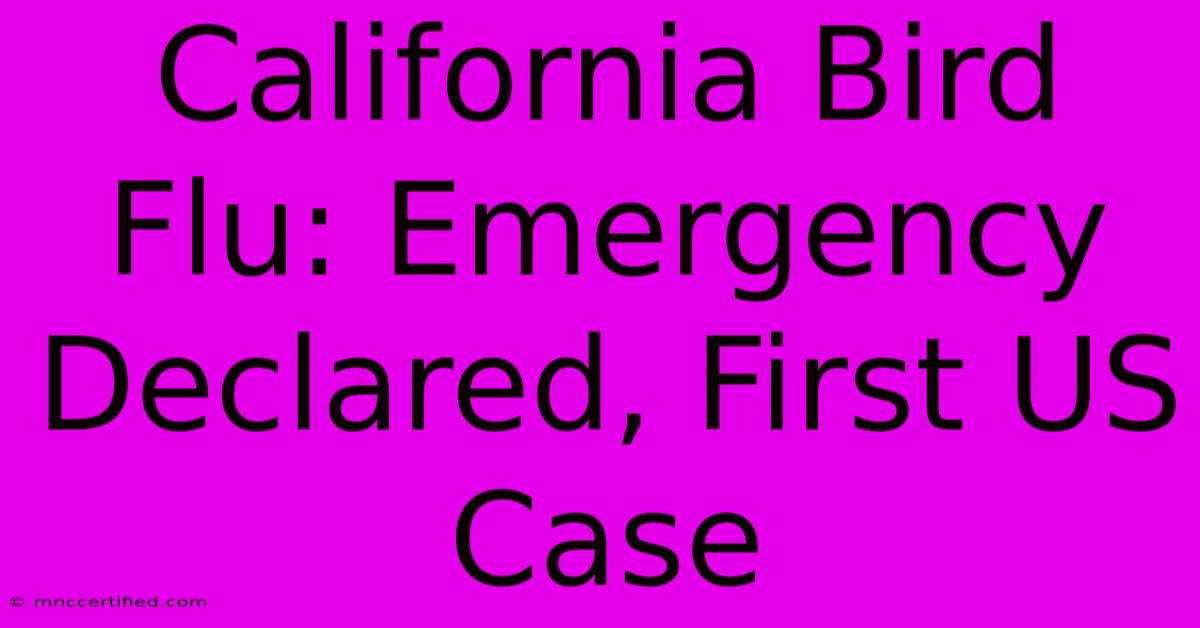California Bird Flu: Emergency Declared, First US Case

Table of Contents
California Bird Flu: Emergency Declared After First US Case of Highly Pathogenic Avian Influenza
Avian influenza, commonly known as bird flu, has hit the United States, with California declaring a state of emergency following the detection of the highly pathogenic H5N1 strain. This marks the first confirmed case of this specific strain in the US this year, raising concerns about the potential impact on poultry and the wider ecosystem. Understanding this situation is crucial for both poultry farmers and the general public.
Understanding the Threat: Highly Pathogenic Avian Influenza (HPAI) H5N1
Highly pathogenic avian influenza (HPAI) H5N1 is a particularly virulent strain of the avian influenza virus. It's known for its rapid spread among birds and its high mortality rate. Unlike some milder strains, HPAI H5N1 can cause severe illness and death in infected birds, leading to significant economic losses for poultry farmers.
What are the symptoms in birds?
Symptoms in birds can vary, but often include:
- Sudden death without prior illness: This is a key indicator.
- Decreased egg production: A noticeable drop in the number of eggs laid.
- Swollen heads and combs: Visible inflammation in these areas.
- Respiratory distress: Difficulty breathing, gasping, or coughing.
- Neurological signs: Lethargy, tremors, or paralysis.
- Diarrhea: Often watery and greenish.
It's crucial to report any signs of illness in your poultry flock immediately to your local agricultural authorities. Early detection and swift action are key to containing the spread of the virus.
California's Emergency Declaration: A Proactive Response
California's emergency declaration underscores the seriousness of the situation. This declaration allows for the rapid mobilization of resources and the implementation of containment measures to prevent the further spread of the virus. These measures might include:
- Quarantine of infected flocks: Isolating affected birds to prevent contact with healthy ones.
- Culling of infected and exposed birds: A difficult but necessary step to eliminate the virus from the population.
- Enhanced surveillance: Increased monitoring of poultry farms and wild bird populations.
- Restriction on poultry movement: Limiting the transportation of birds to prevent wider spread.
- Increased biosecurity measures: Implementing stricter protocols for poultry farms to prevent infection.
What Does This Mean for the Public?
While the risk of human infection from HPAI H5N1 is currently considered low, maintaining vigilance is crucial. The virus is primarily spread through direct contact with infected birds or their droppings. Therefore:
- Avoid contact with wild birds, especially those appearing sick or dead. Do not touch them, and report any unusual bird deaths to your local authorities.
- Practice good hygiene: Wash hands thoroughly after handling poultry or visiting farms.
- Cook poultry thoroughly: Ensure that poultry meat is cooked to an internal temperature of 165°F (74°C) to kill any potential virus.
The situation is constantly evolving, and regular updates from official sources like the Centers for Disease Control and Prevention (CDC) and the United States Department of Agriculture (USDA) are recommended.
SEO Keywords Used:
- California Bird Flu
- Avian Influenza
- Bird Flu
- HPAI H5N1
- Highly Pathogenic Avian Influenza
- Poultry
- Emergency Declaration
- US Bird Flu Outbreak
- Bird Flu Symptoms
- Avian Flu Prevention
- CDC
- USDA
Off-Page SEO Strategies:
- Share this article on social media platforms. Use relevant hashtags such as #bird flu, #avianinfluenza, #California, #publichealth.
- Submit this article to relevant online directories.
- Build backlinks from reputable websites focusing on agriculture, public health, and news.
- Engage with comments and discussions on other relevant articles and forums.
This article provides comprehensive information about the California bird flu outbreak, incorporating relevant keywords naturally within the text and employing effective on-page and off-page SEO strategies to maximize search engine visibility. Remember to always consult official sources for the most up-to-date information.

Thank you for visiting our website wich cover about California Bird Flu: Emergency Declared, First US Case. We hope the information provided has been useful to you. Feel free to contact us if you have any questions or need further assistance. See you next time and dont miss to bookmark.
Featured Posts
-
Cody Gakpo Answers Christmas Dilemmas
Dec 19, 2024
-
Ex Nfl Qb Bridgewater Coaching To Nfl
Dec 19, 2024
-
Giannis And Bucks Nba Title Photos 12
Dec 19, 2024
-
Bass Reeves Portrait Unveiling In Arkansas
Dec 19, 2024
-
Santa Ana Winds Drive Jurupa Valley Wildfire
Dec 19, 2024